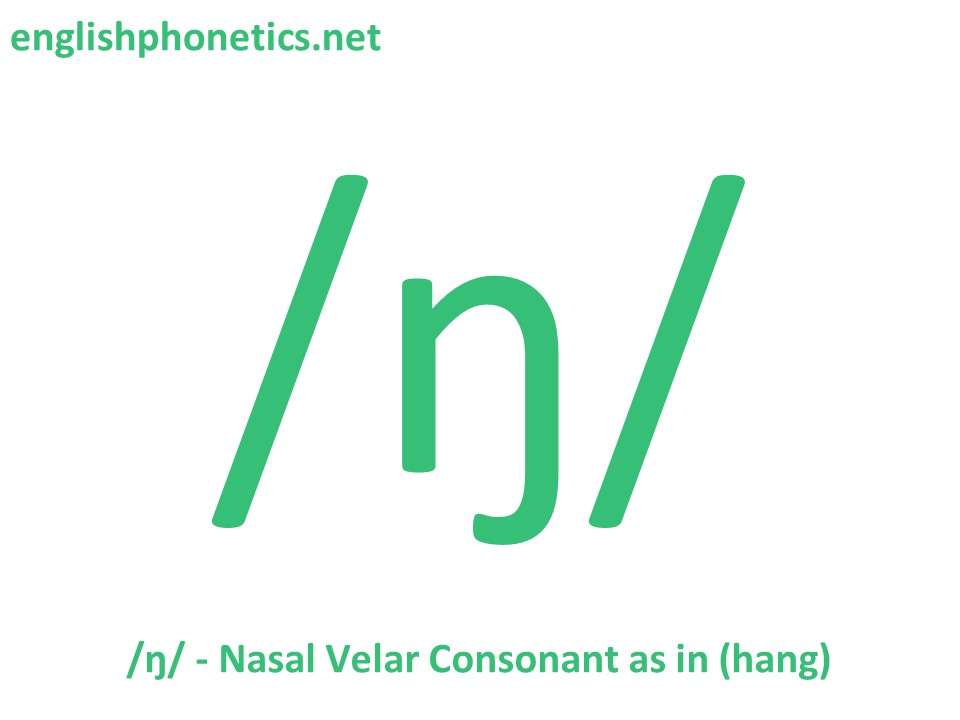Spelling:
- "ng" - ring
- "n" (before /k/ or /g/) - pink, finger
LISTEN
The sound /ŋ/ can appear in these consonant clusters:
-
Beginning of a Syllable
(none)
-
End of a Syllable
| ng_final_clusters.mp3 |
/ŋk/ ("nk" / "nc") - pink, function
/ŋks/ ("nks" / "nx") - sinks, lynx
/ŋkt/ ("nked") - thanked
/ŋz/ ("ngs") - things
/ŋθ/ ("ngth") - length
/ŋd/ ("nged") - hanged
/ŋks/ ("nks" / "nx") - sinks, lynx
/ŋkt/ ("nked") - thanked
/ŋz/ ("ngs") - things
/ŋθ/ ("ngth") - length
/ŋd/ ("nged") - hanged
Grammar Tip:
The sound /ŋ/ is part of the suffix "-ing." This suffix is used to mark several categories of words in English.
- Progressive verbs: I was sleeping. You are cooking.
- Gerunds: Sleeping is good. Writing is hard.
- Present participial adjectives: The movie was exciting. This class is boring.
COMPARE
Compare /ŋ/ with /g/:
| compare_ng-g_1.mp3 |
/ŋ/.../g/.../ŋ/.../g/.../ŋ/.../g/...
These are both voiced velar consonants. However, /g/ is a stop while /ŋ/ is a nasal. When you pronounce /ŋ/, air should flow out of your nose.
These are both voiced velar consonants. However, /g/ is a stop while /ŋ/ is a nasal. When you pronounce /ŋ/, air should flow out of your nose.
You can hear the difference between /ŋ/ and /g/ in these words.
| compare_ng-g_words.mp3 |
1. A. bang, B. bag
2. A. hung, B. hug
3. A. tang, B. tag
4. A. rings, B. rigs
5. A. longing, B. logging
6. A. single, B. seagull
2. A. hung, B. hug
3. A. tang, B. tag
4. A. rings, B. rigs
5. A. longing, B. logging
6. A. single, B. seagull
Now, compare /ŋ/ and /n/:
| compare_ng-n_1.mp3 |
/ŋ/.../n/.../ŋ/.../n/.../ŋ/.../n/...
These are both nasal consonants. However, /n/ is an alveolar nasal and /ŋ/ is a velar nasal. When you pronounce /ŋ/, the back of your tongue should touch the back of your mouth and the tip of your tongue should be low in your mouth..
These are both nasal consonants. However, /n/ is an alveolar nasal and /ŋ/ is a velar nasal. When you pronounce /ŋ/, the back of your tongue should touch the back of your mouth and the tip of your tongue should be low in your mouth..
You can hear the difference between /ŋ/ and // in these words.
| compare_ng-n_words.mp3 |
1. A. long, B. lawn
2. A. hanged, B. hand
3. A. things, B. thins
4. A. singer, B. sinner
5. A. winging, B. winning
6. A. forgiving, B. forgiven
2. A. hanged, B. hand
3. A. things, B. thins
4. A. singer, B. sinner
5. A. winging, B. winning
6. A. forgiving, B. forgiven
PRACTICE
Listen and repeat these words:
| words_with_-ng-.mp3 |
|
1. long
2. sing 3. hang 4. young 5. things 6. drink 7. thanks 8. angry 9. single 10. length |
11. monkey
12. blanket 13. uncle 14. searching 15. wanting 16. conquest 17. language 18. meaningful 19. ingredient 20. belonging |
Now, practice /ŋ/ in sentences. Say the words first, then the sentences.
| sentences_with_-ng-.mp3 |
1. young - engaged - ring
In America, a young engaged woman wears a ring..
2. uncle - helping - hang
My uncle is helping me hang curtains.
3. bring - missing - ingredient
Can you bring the missing ingredient?
4. drink - something - evening
I like to drink something hot in the evening.
5. king - strength - ruling
A king needs strength for ruling well.
6. thinking - things - long
I've been thinking about these things for a long time.
In America, a young engaged woman wears a ring..
2. uncle - helping - hang
My uncle is helping me hang curtains.
3. bring - missing - ingredient
Can you bring the missing ingredient?
4. drink - something - evening
I like to drink something hot in the evening.
5. king - strength - ruling
A king needs strength for ruling well.
6. thinking - things - long
I've been thinking about these things for a long time.
To practice with different varieties of English, choose another native English speaker by clicking one of the links below:


